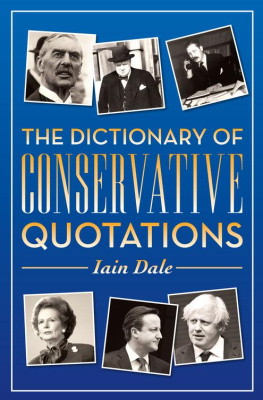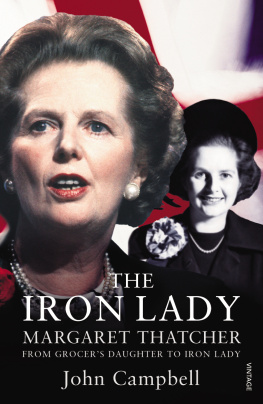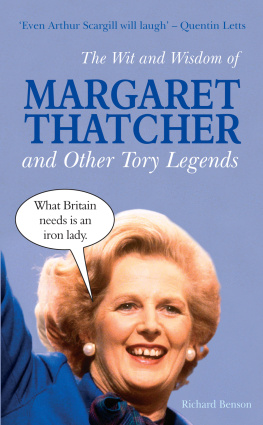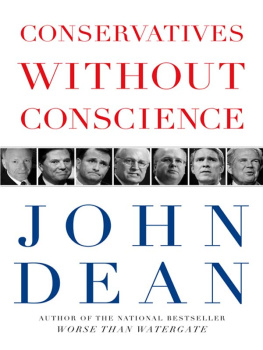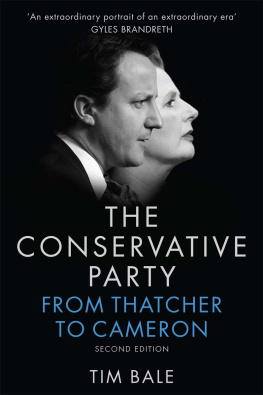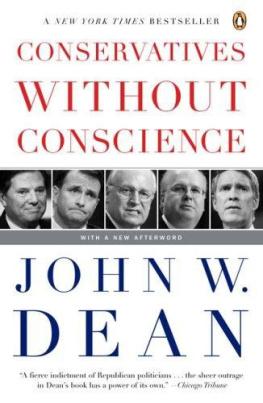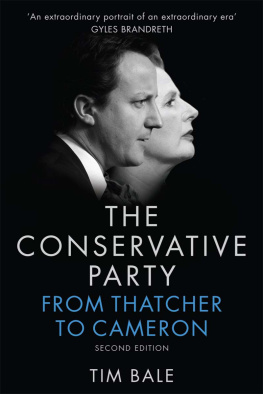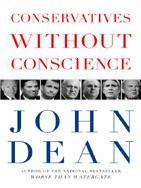MARGARET
THATCHER

 ON
ON 

LEADERSHIP

MARGARET
THATCHER

 ON
ON 

LEADERSHIP

LESSONS FOR
AMERICAN CONSERVATIVES TODAY

NILE GARDINER
AND STEPHEN THOMPSON

Copyright 2013 by Nile Gardiner and Stephen Thompson
All rights reserved. No part of this publication may be reproduced or transmitted in any form or by any means electronic or mechanical, including photocopy, recording, or any information storage and retrieval system now known or to be invented, without permission in writing from the publisher, except by a reviewer who wishes to quote brief passages in connection with a review written for inclusion in a magazine, newspaper, website, or broadcast.
First ebook 2013
eISBN 978-1-62157-179-7
The Library of Congress has cataloged the hardcover edition as follows:
Published in the United States by
Regnery Publishing, Inc.
One Massachusetts Avenue NW
Washington, DC 20001
www.Regnery.com
Manufactured in the United States of America
10 9 8 7 6 5 4 3 2 1
Books are available in quantity for promotional or premium use. Write to Director of Special Sales, Regnery Publishing, Inc., One Massachusetts Avenue NW, Washington, DC 20001, for information on discounts and terms, or call (202) 216-0600.
Distributed to the trade by
Perseus Distribution
250 West 57th Street
New York, NY 10107
To the Iron Lady.
A fearless warrior for freedom.
CONTENTS

We believe that individuals have a right to liberty that no state can take away. That government is the servant of the people, not its master.
MARGARET THATCHER, SPEECH TO CONSERVATIVE PARTY CONFERENCE, OCTOBER 14, 1988
T he reelection of Barack Obama left American conservatives as close to despair as they had been in decades. Those are precisely the circumstances in which the leadership of Margaret Thatcher is most instructive and inspiring.
Obamas America and 1970s Britain
The parallels between the United States under Barack Obama and the Great Britain of 1979 are striking. Thatcher took the helm of a country that was economically moribund, internationally inert, and utterly demoralized. If anything, the challenges she faced were even greater than those faced by American conservatives today. Decades of socialist rule had created a society where dependency on government was chronic. The welfare state, engineered by the Labour government that came in after the Second World War, was all-consuming and vastly expensive. It was the enemy of free enterprise, and it fostered an anti-capitalist culture, reinforced by powerful public-sector unions. The government was bloated, hugely bureaucratic, and ineffective. Small government conservatism had been largely written off, even by much of the leadership of the Conservative Party itself. Britains ruling elites were convinced that the country was in irreversible decline.
After she overcame tremendous obstacles to become the leader of the Conservative Party in 1975, Margaret Thatcher outlined a conservative agenda for retaking power that challenged the ideology of socialism, rejected big government, and stood for economic liberty. She rejected the idea that Britains best days were behind it. She offered a relentlessly optimistic vision of the future, giving hope to millions of Britons who wished to enjoy the fruits of a capitalist economy and improve their circumstances.
Upon becoming prime minister, Thatcher embarked on the biggest downsizing of government in modern British history, privatizing large state-owned industries and utilities. Her government sold off large numbers of council homes (public housing), allowing millions of Britons to own their own homes for the first time. In addition, millions more bought shares in privatized companies, giving them a stake in Britains economic revival. At the same time, she took an axe to government spending, reined in the national debt, cut taxes, and revitalized the City of London, all with an emphasis upon reducing the role of the state and encouraging individual responsibility.
The economic revival at home was matched by robust British leadership abroad. Thatcher restored British military capabilities and aggressively fought terrorism. Her cultivation of the reformist Mikhail Gorbachev, while stiffening the backbone of the West in confronting communism, was vital to the downfall of the Soviet empire.
There Is Still Hope for America
Margaret Thatcher, like Ronald Reagan, demonstrated why principled conservative leadership works. Liberalism reigns in the White House, but America remains a conservative nation at heart. Polls have consistently shown that conservatism is the leading ideology in the United States, with conservatives outnumbering liberals by an almost two-to-one margin.
Not only is America an ideologically conservative country but it also benefits from a remarkably strong conservative movement, from the big think tanks of Washington to thousands of grassroots organizations that campaign for limited government. American conservatism is strengthened by Fox News and by talk radio, with hugely popular hosts such as Rush Limbaugh, Sean Hannity, Mark Levin, and Laura Ingraham. The most widely read national newspaper is the
Next page

